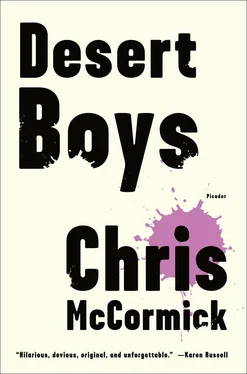Chris McCormick
Desert Boys
For Mom, Dad, and Madelein
Do I stay or do I go?
And do I have to do just one?
— Jackson Browne, “The Fairest of the Seasons”
MOTHER, GODFATHER, BABY, PRIEST
Not long ago, three desert boys built a paintball field in the middle of nowhere. The idea came to Daley Kushner after his mother, a severely cautious Armenian immigrant unwilling or unable to differentiate between simulated violence and the real thing, refused to pay for her only son to be hunted down “like a mule” at the professional field in Acton. Daley didn’t bother informing her that nobody, not ever, had hunted a mule. He just took his idea to the other boys, who immediately agreed to the plan. Dan Watts, whose parents owned a landscaping business, offered to borrow the necessary equipment, and Robert Karinger — whose dad had fought in the First Gulf War — had the idea to call each other by last name only: Kush, Watts, and Karinger. This gave an otherwise fun project the heaviness of what Karinger called “a life-and-death enterprise.”
“Why Kush,” said Watts, “and not Kushner?”
“Kushner sounds too much like my name,” said Karinger. “We’d confuse people.”
Nobody, Kush knew, would ever confuse him for Karinger, and what people there were to confuse, Kush couldn’t say. He was just grateful to have a nickname, and ready to get to work.
This was the summer before high school. The boys biked from town to the Antelope Valley’s uncultivated desert, working long days so they could get the most use out of the paintball field before classes started in the fall. The dirt from newly dug trenches and bunkers established rings of three-foot-high passageways and walls, which Karinger called “bulkheads.” From time to time, they ventured farther into the desert to find and collect abandoned furniture: a plaid La-Z-Boy sofa — orange foam innards jutting from its arms — made a quality barrier along the north section; a large brass-framed mirror, cracked in places and fogged by the remnants of old adhesives, provided an interesting Enter the Fist effect from an otherwise blind trench. Other objects, including many of the shredded tires lining the nearby 138, were sorted into tall wobbling piles. After weeks of shirtless, blister-forming labor in 100-plus-degree weather, the three boys flexed and compared their newly shaped and sun-soaked muscles. Then they rode home to fetch their guns.
Karinger was the only one to bring along any armor. He owned a face guard designed to look like a World War II — era gas mask. He never wore it, though, and simply carried the mask under his arm in the desert. Holding the mask seemed to give Karinger an indisputable authority, which he used to set up the rules of the game.
“Since there’s three of us, we can only do one of two things — every man for himself, or two-on-ones, rotating the lone wolf.”
The idea of being ganged up on had always frightened Kush, but not badly enough to consider inviting one of the sisters — Karinger’s or his own — to even the teams. He suggested they stick to every man for himself. Then, suddenly afraid, too, of never having a partner: “Or two-on-ones, if you guys want.”
Karinger pressed the tip of his gun against Kush’s chest. Kush hadn’t read Freud yet, but he still felt a kind of thrill.
“In war,” Karinger said, “indecision means death.”
Watts, half-Mexican, tanned while the others burned. He offered his suggestion coolly. “Let’s do every man for himself, see how it goes, and then reassess.”
“Right,” said Karinger. He aimed his gun a few inches from Kush’s foot and fired three shots at a rock the size of a coyote’s skull. He told Kush to pick up the rock and toss it to him.
“This,” Karinger said, holding the paint-splattered rock in front of him, helmet still under his arm, “is the Stone of Victory. Be the first to take the Stone back to your starting point without getting hit, and you win.” He placed the Stone of Victory in the crook of a Joshua tree’s arm.
The three stood back-to-back-to-back and, as directed by Karinger, took one hundred long steps each in his own direction. Then they waited for Karinger to fire his gun in the air — the designation of the start.
* * *
Also not long ago, though more recently, I got an email inviting me to a baptism that would take place in my hometown, the Antelope Valley.
The baby to be baptized was a boy whose father happens — or happened — to be an old friend of mine from childhood. The boy’s mother sent the invitation along with an apology for not sending a hard copy. She didn’t know my physical address, she explained, and I wasn’t on any of the social networks. After a bit of investigation, she found a blog I’d contributed to, and an email address. She signed off:
Hope to see you,
Jackie (Connolly) Karinger
☺
For some time after reading the message, I wandered around my apartment, thinking of little else. This was the second piece of news I’d heard about my old friend Karinger in as many months, after a gulf of communication between us that lasted over five years (and never, finally, resolved itself). The other bit of news being that he’d been killed in Kandahar, Afghanistan, in November. Another friend from that time, Dan Watts, with whom I’d been in slightly better touch, called in January to tell me. At one point in the conversation, Watts said: “I always imagined those soldiers using paintball guns, that the war was just a large-scale version of what we played as kids.” I confessed that the same thought had occurred to me.
Still, I couldn’t focus on much in Jackie (Connolly) Karinger’s message other than the strange addition of the smiley face. In bed or in the shower, I’d find myself ascribing to the face some meaning, a hint at something larger, something Jackie (Connolly) Karinger might have wanted to say to me, but could not.
One day in February, I decided to take a walk to mull over the invitation. Even on sunny days, Oakland at that time of year was mysteriously wet and chilly. A used bookstore stood ten blocks from my apartment, and I didn’t realize I was heading there until I was drying my shoes against the mat out front. Lloyd Alcero, an old classmate of mine at Berkeley, greeted me from the register at the center of the store. The place was small, and I could see I was the only customer.
“Hey,” I said. The sound of my voice came out tinny and weak. I hadn’t spoken to anyone in days. I cleared my throat and moved toward the back of the store, to a section I’d been interested in some time ago, but not so much recently: GLOBAL TERRORISM. Someone had placed a sticker of W’s face on the label. Neck tilted, I scanned the spines along the shelves.
Lloyd Alcero came up behind me. “Doing research for another prize-winning essay?”
There had been an essay contest on campus a few years earlier for English majors. My submission was a piece about the effects of past wars on American fiction (specifically, Salinger’s), compared to the inability of our current wars in the Middle East to produce similar results (due, according to my thesis, not only to the lack of a draft but to an anomalous combination of what I called “unwarranted-ness and apathy” as well). I didn’t — and don’t — know if I believed that, but the essay turned out to win the top prize: publication in Berkeley’s alumni magazine, California, along with a check for five thousand dollars. Naturally, the only people who remembered I’d won were other participants in the competition, including Lloyd Alcero, who brought up the topic every time we spoke.
Читать дальше












